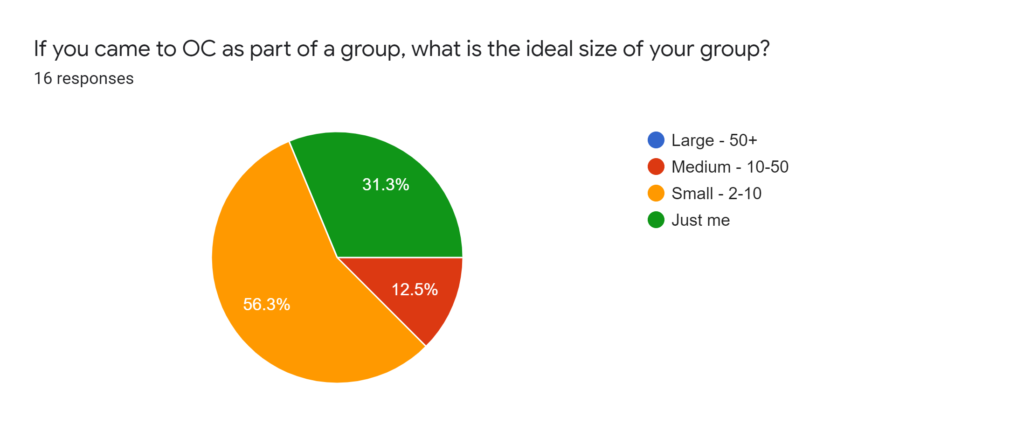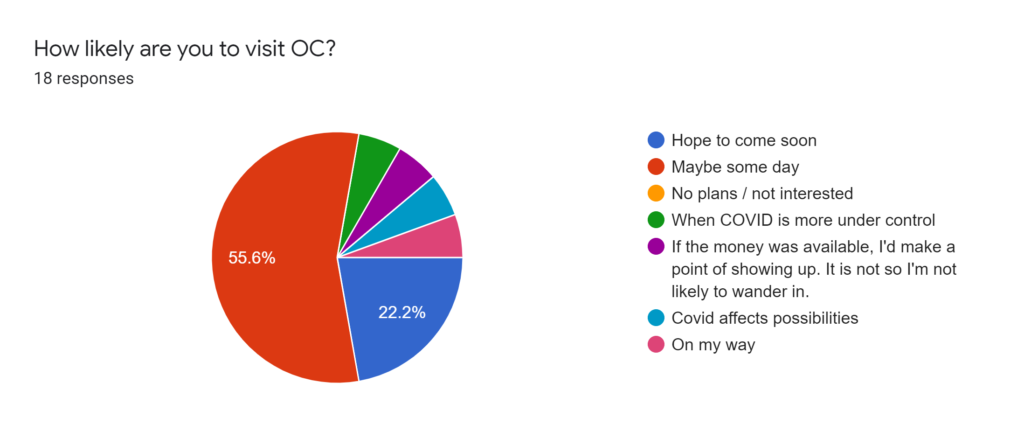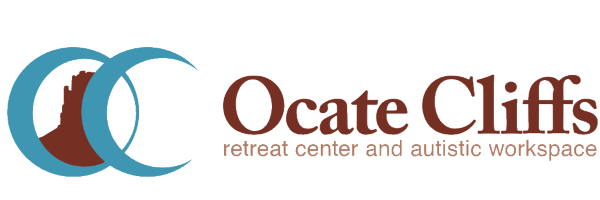We sent out a survey – the responses are summarized here, with some editorial at the end.
Formats and Topics
- What is your ideal group size
- Half prefer small (2-10) and a third prefer “just me”.

- What would be the most valuable thing you could get out of traveling to a retreat destination?
- 13 of 18 responses listed “time in nature/solitude” as the primary thing. A few listed additional points: photography, spiritual work, and that this could be away from artificial, noisy life.
- 12 of 18 listed “meeting other autistic people”, some as secondary to solitude. Several listed volunteering and working together as the way of socializing. Notable specific answers are: “It’d be lovely to be able to feel comfortable with an autistic group but that’s generally not happened.”; “Interaction in groups like campfires, dancing, laughter.”; “connecting with members of my own community in meaningful ways”
- 4 listed “emotional/spiritual growth”
- 3 listed acquisition of new skills
- 2 listed activism, specifically “Recreational activism, preferably in the form of ecotourism–possibly in the form of surveys of local flora/fauna, sustainable living projects, etc.”
- Which event formats or activities would interest you?
- 6 of 18 responses listed verbal/mental type things such as discussions, presentations and workshops
- 5 listed hands-on work such as construction or whatever is needed, especially if there are “specific goals and outcomes”.
- 3 listed combinations of time in nature, walks, and meditation, with 3 others listing recreation more generally. Some noted the need for these activities to be self-directed or with only a few others.
- 3 listed “no structure” as best, with 2 more preferring limited structure.
- A couple of additional responses were: entertainment and arts, structured cooking and meal times
- If you went to a topic-focused retreat, what topics would interest you?
- 16 total responses and most listed more than one thing
- (12) autistic culture, autism, and acceptance of diversity. Including “late adult diagnosis”; “autism from a strength perspective, making autistic community connections so we can better support each other”
- (6) movement: yoga, tai chi
- (5) astronomy
- (4) spirituality, meditation, tarot
- (3) women’s issues/culture
- (3) self-help, healing, or coping/trauma. Notable: “it’s a bit late to learn social shills, but I’m still trying”
- (3) cooking
- (3) arts, music, and crafts such as pottery
- (2) LGBTQ2SIA and autism
- (2) hiking, nature (presumably directly as a topic and not only a format or setting)
- (2) gardening, permaculture
- (2) social justice activism, environmentalism
- (1) photography and video, specifically “videoing specimens behaving in their natural environments” to make instructive documentaries
- (1) academic topics, namely “the individual and society”
- In the autism world there is a lot of talk about skills to prepare autistic people for jobs. Which job skills if any do you want to develop?
- 6 of 13 responses listed social skills and communication, including “dealing with the stress of being in a neurotypical workplace and dealing with workplace socializing and hierarchies”; and “feeling safe/appreciated in the workplace”. One idea is to “take cool pics of ea other for our social media”. Another respondent said about learning social skills: “not my first choice, but is maybe my first need.”
- 2 listed generic skill building such as “skills focused on strengths” and “better prepared expectations”
- 1 listed teaching skills, specifically to “learn ways I can help educate non-autistic people about the ways I can work best and contribute most rather than ‘learning skills’ about how to be more like my non-autistic colleagues; the latter is a mask”.
- 1 listed computer skills
- 1 listed construction skills
- 1 listed photography, video post production and related
- 1 listed emotional growth
Logistics
- How likely are you to visit OC?
- A majority said “maybe some day”, and the second largest chunk listed COVID as a barrier.

- What significant barriers would there be to making the trip?
- 16 total responses, and many people listed more than one barrier.
- (5) not enough money
- (4) lack of reliable transportation
- (4) health issues or pandemic
- (3) lack of time, competing commitments, or no way to take time off work
- (3) trouble finding someone to take care of house/plants/animals, or needing to be home to care for parents or other family members
- (2) travel anxiety, first time traveling
- (1) executive functioning or related issues such as getting lost, can’t remember numbers, faceblindess; all of this leading to dangers in traveling
- (1) lack of autonomy, or not being allowed to travel
- (1) needing to travel with pets but having no place for them at OC
- (1) lack of reliable means to offload photos from digital camera
- What hardships in being here would you experience?
- 14 total responses, and many people listed more than one barrier.
- (4) electricity, specifically for health needs such as CPAP machine (see editorial below)
- (3) lack of enough solitude or autonomy, such as staying in own camper, needing a lot of time in the bathroom
- (3) health issues or medications, including high altitude
- (3) dietary issues – not being able to meet specific restrictions or food not being good enough
- (2) chemical sensitivity
- (1) loss of income while traveling
- (1) being away from television
- (1) lack of home-based supports for things like anxiety
- What other access needs do you have? Listing the specific responses here (some access needs were also covered in the above topics.)
- Need nighttime quiet hours for noise sensitivity
- Would need somewhere I could retreat and lie down during the day / A personal space to retreat to when social interactions get overwhelming
- A lot would depend on my access to food and my personal comfort level
- Just more confidence to travel far away independently
- Difficulty with stairs
- A point person to ask questions – to know who can be a support person when in distress, overwhelmed, etc.
- Clear & direct communication of expectations upfront and throughout as they come up.
Big picture
- Is our focus area (building a space managed by and for autistic people) a valuable project for the autistic community?
- 100% of responses were positive, including “Hell yes”; “would have liked learning about you when i was younger”; “Absolutely”; “OMG yes!!!”; “Yes very much so! We need more spaces managed by and for autistic people in this world.”
- Divergent Labs is one of a few organizations with a majority autistic board and leadership. What is your opinion on what else the organization should be doing to support autistic people?
- (The responses did not align into categories, so each one is listed separately here.)
- Visibility/awareness within society to enhance awareness and appreciation
- Listen. Engage. Imagine. Create. All the things you seem to be doing already.
- Having people who work with autistic people who may or may not be autistic
- Keep your focus narrow and specific.
- It’d help to grow the group throughout the SW US.
- The autistic community is so diverse and the efforts to homogenize it’s members seems so outside of traditional methods. Honor each person as unique.
- Please let as many people as possible volunteer together at Ocate Cliffs if they do not have to follow any Coronavirus restrictions
- Working to build a network of autistic people and organizations to strengthen us as a whole
- Financial needs towards better quality of life
- I guess I don’t know enough about everything the organization has been doing. I’ve been a little bit unclear about exactly what’s going on – I’ve just been getting occasional emails for some years now, and it does seem like good things are happening!
- If you are interested in being more involved with the organization, note that here
- 6 of 11 responses focused on the lack of clarity about how to be involved such as “I am not uninterested, but logistically unclear”; “I am severely limited in how i could help; but, yes. I’d like to be able to help”; “I’m just hard pressed to know how”; “Would need to know what it entails”
- 2 have been involved already
- 2 are wanting to get involved now
- 2 reiterated barriers such as heath, poverty and travel
- If you know of opportunities to collaborate with other organizations, please note them here
- Collins Lake Ranch in Cleveland, NM [a DD-waiver supported group home]
- Maybe I could get work helping autistic folk with own company build websites?
- Autistic Nature
- Ocate Cliffs has not yet had enough income to pay staff, so everyone, including the managers, have been volunteers. In order to both provide some payment to staff and to fund further development, what kind(s) of fundraisers would you be interested in participating in?
- A few responses clearly involved the respondent: “Bake sale or cafe setup, I’m a baker”; and “I’ve helped the design push for a t-shirt fundraiser”
- A few people pointed out barriers in fundraising: “I’m terrible with money and activities related to money gathering and handling.”; “Most of us don’t have large lists of contacts or very many facebook friends, so grassroots fundraising can be a challenge”; “I’m nonsocial, in that i don’t socialize, though i like people”. 2 others said they could help if barriers were reduced: “would need companion if interacting with group or finding places”; and “once I have a network established”.
- These other fundraising ideas were offered as ideas:
- online or brick and mortar presence to offer handicrafts etc. that autistic/neuro-diverse people create
- garden-raised produce and value-added products of same
- some sort of raffle
- can be added to amazon so people contribute
- make and sell soaps, grow and sell herbs
- advertise in a publication aimed at the autistic audience
- GoFundMe style campaigns
Editorial
I’ve shortened and categorized the answers above (hopefully without much bias) and here I will add my analysis of what the results mean. Although the sample size is small, the results mirror what we’ve experienced on site so far, and bring to light a few difficult contradictions in our mission and audience.
One (apparent) contradiction is between the need to be with people and make friends or network, and simultaneously a need for alone time or very limited social demands. An observer might say “you can’t have it both ways” or think that a retreat setting is not appropriate for someone who doesn’t want to be around people. But the need to connect with people seems to be about quality over quantity, so the ideal would be a very supportive small group that we get fulfillment from during only a small part of the day, while the rest of the day is on our own.
Another contradiction is the simultaneous need for learning social skills (as needed for jobs) but also being respected for who we are – the competing demands of changing ourselves to “fit in” versus not being required to change. It’s a sore spot in the whole autistic world which sometimes leads to the false dichotomy between “I’m perfect as I am and never need to change” versus “I need to become someone else (or pretend to)”. I’ve looked at this contradiction from the perspective that we all need to grow, whether disabled or not, and we can become our best selves with some work. Our best selves are authentic, and sometime that means being very far from the norm.
A third and related contradiction is between barriers to inclusion and needs for inclusion. There seems to be a pattern that people who are able to get included in things near where they live are not as inclined to try to find an inclusive space far away. OC has been seen as a place of last resort by some who have more barriers than usual, such as health, anxiety, or other things that make involvement in typical volunteer or job settings impossible. This could lead to unrealistic expectations or an imbalance between what someone needs and what they can offer. The culture at large has a solution which is to sort people into givers vs takers, staff vs clients, or donors vs “the needy” – but we don’t want to make that division. Instead, when we first get what we really need, ideally we would then be able to give back – or give forward to the next person who comes.
A fourth contradiction is about financial sustainability – how we make the project self-supporting. The main plan so far has been to charge enough for retreat guests that staff can be paid from that income. In particular it would have to be large groups paying around $1000 per night to reach the scale or self-sufficiency. But some of the answers on the survey suggest that providing that kind of service is opposite to why people would want to come. Some may not be willing or able to do that kind of work even with accommodations, even though those same people energetically support what we are doing. If we tried to get money from the usual disability-related sources like medicaid, it could devolve into a provider/client model, which might pay for it, but could destroy the original concept.
In a more general way, any level of success is a danger. When we find ourselves at the lowest tiers of the social ladder but are able to move up, we would be in danger of dumping those still at the bottom as we climb ahead competitively. So it is important to keep the values intact and to remain that place of last resort while also becoming more widely known. Even other autistic-led organizations and social media groups appear to cut out the less socially successful people as they gain influence.
Some of the access needs listed in the reposes may seem like big problems but are actually easily met – for example we have electricity, can avoid chemicals that cause reactions, and can provide for plenty of away-time. A lot of barriers can be solved if the motivation is to solve those issues for people individually rather than have a one-size-fits-all plug-and-play program. We experimented with some rules at one point but found that accommodations and individual circumstances are more important than rules.
I started this project because it’s something I want and would have been a perfect thing for me when I was younger. I assumed that some other people would be like me, but it’s still not clear if there are many others.
If you filled out the survey and made an offer or need to know how to be involved, please be aware that it was anonymous so please follow that up with an email.
Prepared by Star Ford, September 2021
